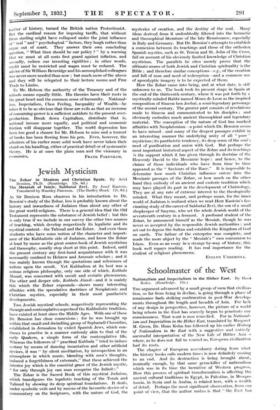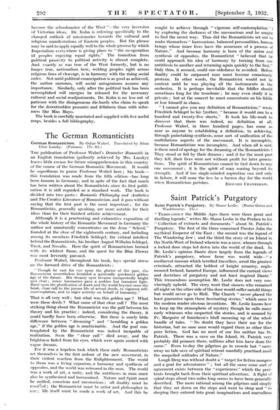Schoolmaster of the West
THE argument advanced by a small group of men that civiliza- tion, so far from being in decline, is going through a phase of renaissance finds striking confirmation in post-War develop- ments throughout the length and breadth of Asia. For lack of any design in perspective, however, the picture of a world being reborn in the East has scarcely begun to penetrate our consciousness. That want is now remedied. For in National- ism and Imperialism in the Hither East, translated by Margaret M. Green, Dr. Hans Kohn has followed up his earlier History of Nationalism in the East with a suggestive and entirely successful interpretation of the New Life of Hither Asia — where, as he does not fail to remind us, European civilization had its roots.
The chapter of European ascendancy dating from what the history books calls modern times is now definitely coming to an end. And its destruction is being brought about, ironically enough, by that same germ-killer of nationalism which was in its time the incentive of Western progress. How this process of spiritual transformation is affecting the ancient cultural traditions in Egypt, in Palestine, in Mesopo- tamia, in Syria and in Arabia, is related here, with a wealth of detail. Perhaps the most significant observation, from our point of view, that the author makes is that " the East bus become the schoolmaster of the West "—the very inversion of Victorian ideas. Dr. Kohn is referring specifically to the changed outlook of missionaries towards the cultural and religious manifestations of Eastern peoples. But the phrase may be said to apply equally well to the whole process by which Imperialism everywhere is giving place to " the co-operation Of peoples enjoying equal rights." The transition from political passivity to political activity is almost complete. And, exactly as was true of the West formerly, but is no longer true, nationalism here, welding peoples right across religious lines of cleavage, is in harmony with the rising social order. Not until political emancipation is as good as achieved, the author surmises, will social antagonisms assume any importance. Similarly, only after the political task has been accomplished will energies be released for the necessary cultural and social readjustments. Dr. Kohn is no less out of patience with the disingenuous die-hards who claim to speak for the downtrodden peasants and fellaheen than with refor- mers like Miss Mayo.
The book is carefully annotated and supplied with five useful maps, besides a full bibliography.































 Previous page
Previous page